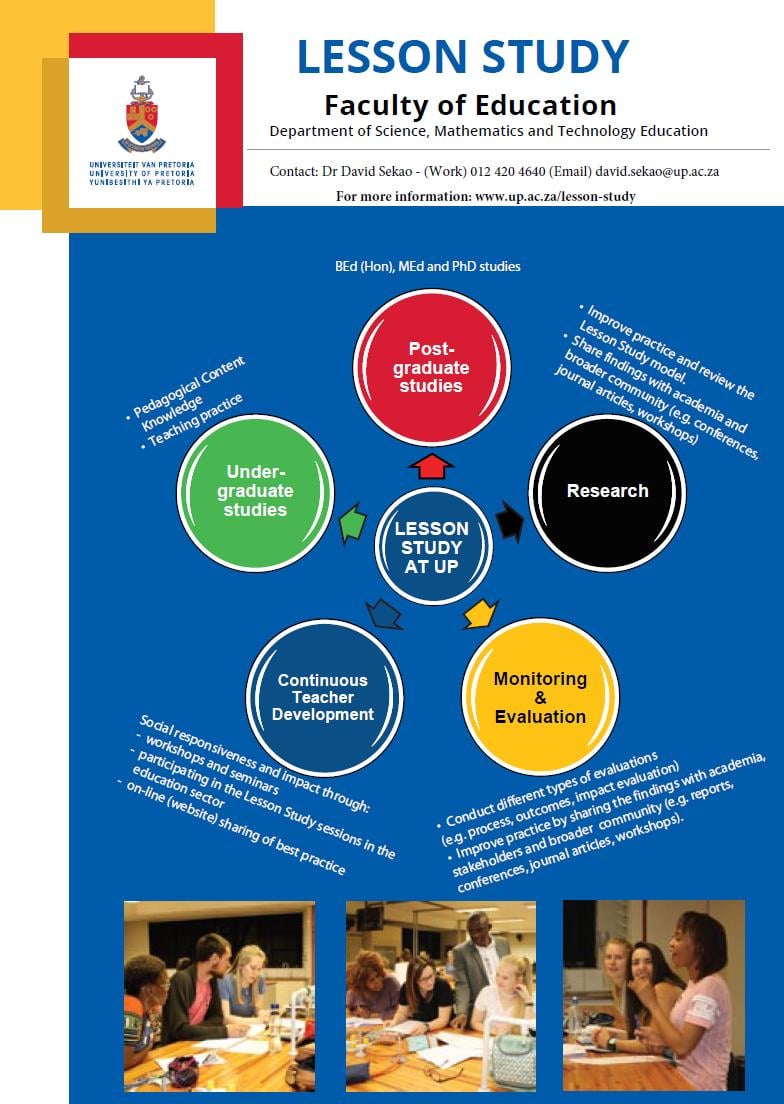The Lesson Study is a teacher development practice that originated in Japan decades ago. Through the Lesson Study, teachers work together to plan a lesson based on a common goal to be achieved; and then one teacher teaches the lesson while the others observe it. Afterwards, the team (presenter and observers) come together to reflect on the lesson with the purpose of refining and improving it further. Originally, the Lesson Study was used to improve the teaching and learning of mathematics and science in primary schools, however this focus has since changed as more and more countries adopted and adapted it to suit their needs.

The use of the lesson study in other subjects and at other education levels (high schools and universities) is gradually gaining prominence. In recent years universities have become the central drivers of the lesson study which has become one of the focus areas for practice and research. The University of Pretoria has formally established a Departmental Focus Area in the Department of Science, Mathematics and Technology Education (SMTE) dedicated to the Lesson Study. The Lesson Study at the University of Pretoria (LSUP) focuses on five key areas of interest (which are linked to the university’s strategic goals):
- Under-graduate studies: Introducing the Lesson Study when preparing new teachers, especially in the methodology modules, provides them with the knowledge and skills they will need during practice. It is envisaged that the cohort of teachers who complete their studies and join the practice will become an instant resource to contribute meaningfully by establishing, sustaining and participating in the Lesson Study clusters/forums.
- Continuous Teacher Development: One of the strategic Goals of the University of Pretoria is To strengthen the University’s social responsiveness and impact in society. Using the Lesson Study to advance this goal is viewed as a mutual benefit for the University and the society (mainly teachers who are already in practice).
- Post-graduate studies: The LSUP provides a research platform for the post graduate students to address the national problems that hinder provision of quality education. In addition, their research findings can be used to inform other studies regionally and internationally, thereby contributing towards the solution of global problems that hinder the provision of quality education.
- Research: Other than conducting research for qualification purposes, the LSUP provides opportunities to conduct research for non-qualification purposes. The Lesson Study provides a bountiful opportunities for research especially in the area of Mathematics Education.
- Monitoring and evaluation: Closely related to the area of research is the area of monitoring and evaluation. Different types of evaluation will be undertaken – they include, inter alia, process/implementation evaluation, outcomes evaluation, impact evaluation. These evaluations could be done for qualification purposes or for the purpose of publication in the form of journal articles. However the most important purpose is to utilise the data/findings to understand what works (or not) thereby improving the Lesson Study as an intervention to improve the teaching and learning of mathematics and other subjects.

Get Social With Us
Download the UP Mobile App